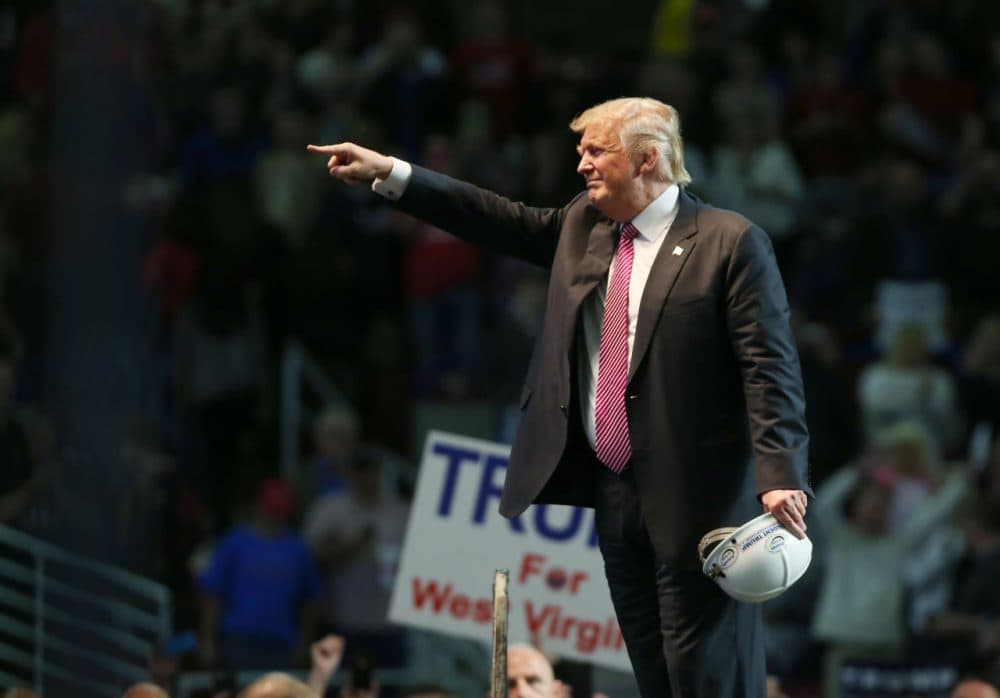Advertisement
Trumponomics 101: Plan To Negotiate Down U.S. Debt Stuns Economists
Resume
As Donald Trump's candidacy comes under increasing public scrutiny, his inflammatory rhetoric and brusque social profile might be what's drawing the most criticism. But it's the businessman's economic plans that should worry voters most, argues The Atlantic's Derek Thompson.
Trump had told CNBC that the U.S. should be able to "make a deal" with creditors, though on CNN today, he said he would not seek to renegotiate with the nation's creditors. "If there's a chance to buy back debt at a discount," Trump said, "that's what I'm talking about."
Thompson joins host Jeremy Hobson for a look at Trump's plans for the economy, which Thompson writes would cause "the greatest, dumbest recession in American history."
Interview Highlights
Explain you comment that ‘Trump’s economic plans would destroy the U.S. economy.’
“Let’s take Trump at his word. He wants to deport 10 to 11 million immigrants, about 7 million of whom are workers, this is a manufactured downturn. You are making 4 percent of the workforce disappear. That is a costly hit to the U.S. economy. Second, let’s continue to take his policies literally. He has a tax plan that would cut revenue by $10 trillion over the next decade, the largest tax cuts in modern history. That would add enormous deficits on top of the deficits already created by taking workers out of the labor force. These actions would require the U.S. to borrow billions of dollars from international markets, the very international markets that he has recently spooked potentially by saying some extremely questionable things about his ability to simply inflate away the debt or manufacture haircuts for U.S. creditors. So when you combine the fact that the U.S. recovery, as stable as it has been, is not altogether robust in terms of GDP growth per year, you put on top of that a manufactured downturn, exporting a bunch of workers while meeting creditors at the same time, you spook them. I do think very much that this would be a manufactured recession.”
Why do economists think Trump’s plans, including repurchasing debt at a lower price, would not work for the U.S. government?
“Fundamentally, Trump is making one good point here and alighting one bad point. The good point that he is making is that the U.S. cannot really default on its debt. We print our own currency. If we owe money, we can always make more. That’s the wonderful thing about controlling your own currency. Of course, making more carries other risks, like the possibility of inflation, but there is really no risk or need to actually default, and this is a point that Trump made very well. He goes on to compare, essentially corporate debt to government debt. I don’t think his plan would do very much to reduce America’ debt burden, it’s debt to GDP ratio in the long term, and I do think that, more importantly, suggesting that he could potentially take some unprecedented moves in the case of higher interest rates to try to reduce America’s debt burden, I do think is a rather dangerous suggestion.”
On Trump’s tax proposals
“This is why it’s so so difficult to pin down Donald Trump. He says he might want taxes to go up, and yet proposes the largest tax cut of any of the Republicans running for president. It’s a very strange thing. If you want a raise from your boss, you don’t go into your boss’s office asking him to cut your salary in half. So I don’t really understand what Trump is arguing here. On the one hand, he has proposed, in writing, a tax plan that would cut revenue by $10 trillion in total and cut taxes, particularly those in the 1 percent and .1 percent. Then he goes on television on Sunday and says he’s actually open to raising taxes on those very people he’s just proposed cutting taxes for. I don’t know what he wants and I think that this feeds into – this is a part of the problem with covering Trump, he seems to say whatever he thinks will get him through that minute, that hour, that interview, that debate and then one day later says something that is essentially the opposite.”
Guest
- Derek Thompson, senior editor at The Atlantic. He tweets @DKThomp.
This segment aired on May 9, 2016.